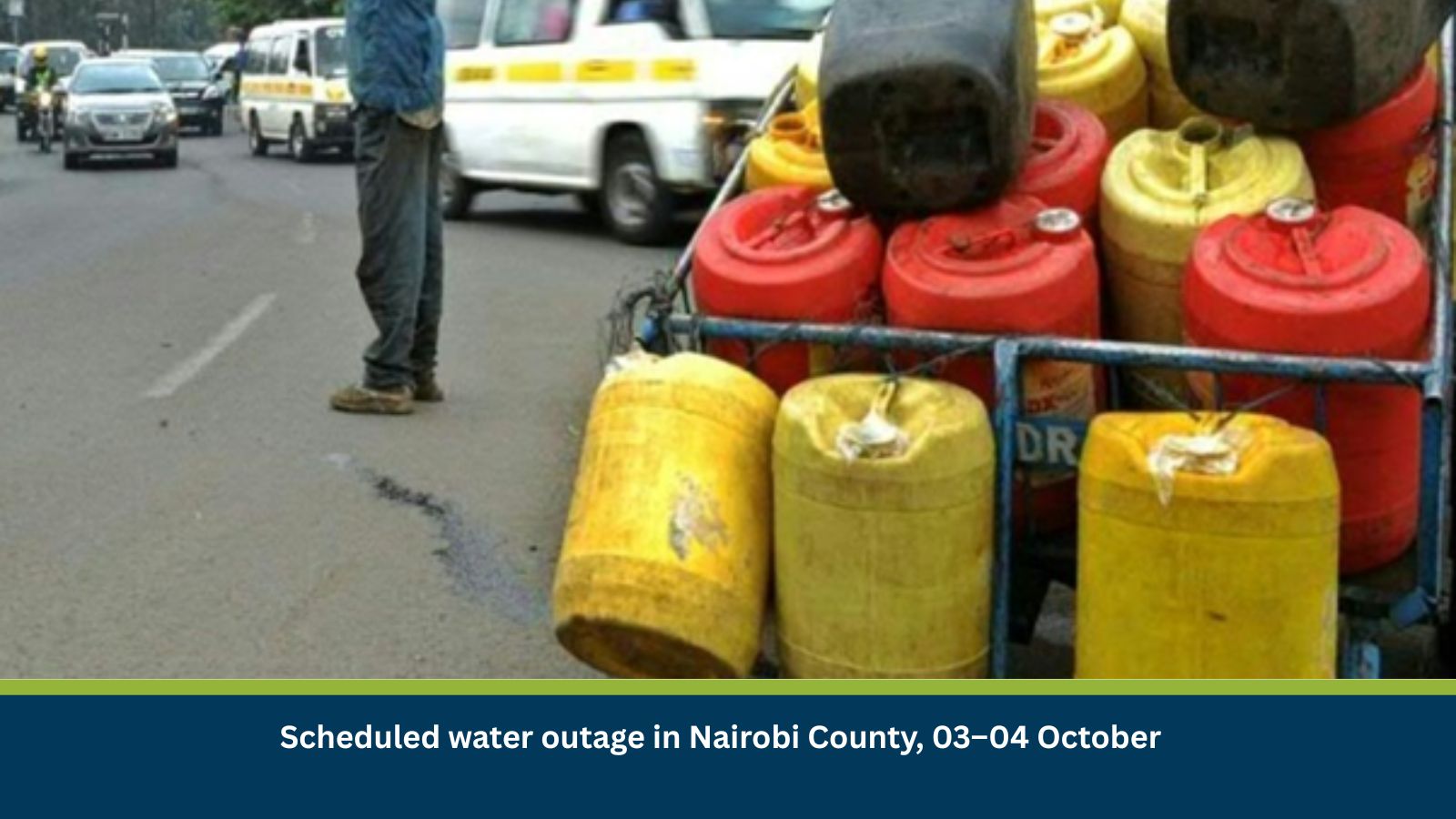What is Risk Analysis in the Context of Critical Infrastructure Events
Critical infrastructure risk analysis examines disruptions to essential utilities like water, power, or transport, and their cascading effects on safety, operations, and public health. In Nairobi, recurrent water outages are a familiar challenge, often linked to planned maintenance or network upgrades. These outages, while temporary, highlight the city’s vulnerability to supply interruptions and the importance of resilience planning. Past city-wide outages have disrupted hospitals, universities, and residential estates, underscoring their significance for both daily life and business continuity.
Executive Summary
- Date of Incident: 03–04 October 2025
- Location: Nairobi County, Kenya (multiple estates and institutions)
- Risk Category: Critical Infrastructure
- Severity Score: 3/5
- Confidence Level: 95%
Nairobi Water has announced a scheduled outage across 14 estates from 03 to 04 October for planned maintenance. Historical patterns show such disruptions typically last 24–48 hours, though restoration may lag in some areas. Businesses reliant on water (hospitality, healthcare, manufacturing) and residents will face significant inconvenience. The event is assessed as moderate severity, high confidence.
Current Updates
Authorities confirmed the outage will affect major residential and commercial estates including UoN, Coptic Hospital, Mater Hospital, Daystar University, Hurlingham Shopping Centre, and several Nairobi suburbs. Residents have been advised to store water in advance. The outage is part of planned infrastructure works to improve supply reliability.
Known Hotspots and Sensitive Areas
- High impact: Hospitals (Coptic, Mater), universities (UoN, Daystar), Hurlingham Shopping Centre, densely populated residential estates (Eastleigh, Buruburu, Langata).
- Medium impact: Commercial hubs along Gitanga Road, Riverside, Mombasa Road, and Bogani Road.
- Low impact: Peripheral estates with borehole access or private storage capacity.
Impact on Transportation and Services
Direct transport disruption is minimal. However, increased vehicle traffic for water collection is likely in affected zones. Services at hospitals, schools, and restaurants may slow due to water shortages. Hospitality and food services could reduce operating hours. Some offices may face absenteeism if sanitation facilities are compromised.
Recommended Actions
- Immediate: Top up all water tanks 24 hours in advance; arrange for water bowsers for hospitals, schools, and large commercial facilities.
- Operational: Temporarily suspend or reschedule non-critical water-intensive tasks (laundries, cleaning services, car washes). Ensure contingency for HVAC and industrial processes.
- Employee Welfare: Issue hygiene advisories (sanitizers, reduced flush protocols, alternative restrooms). Enable flexible hours or remote work where possible.
- Stakeholder Communication: Notify clients and suppliers of potential delays or adjusted services. Provide helplines for urgent needs.
- Post-Event: Flush plumbing systems and inspect equipment before resuming full operations. Incorporate lessons learned into business continuity plans.
Multidimensional Impact
The outage will inconvenience tens of thousands of residents and businesses, straining healthcare facilities and hospitality sectors. Public frustration may rise if restoration is delayed, adding to ongoing grievances in Nairobi such as strikes or protests, though escalation risk is low. Economic impact will mostly be borne by SMEs in water-reliant sectors. Environmentally, bottled water use may spike, contributing to temporary increases in plastic waste.
Emergency Contacts
- Police: 999 / 112
- Fire Department: 999 / 112
- Ambulance: 999 / 112 / 0722 284 831 / 0731 222 222
- Nairobi Water Hotline: +254 (0) 722 836 701
- Kenya Red Cross (Toll-Free): 1199
Final Thoughts
This planned outage is a moderate disruption with high certainty. While no direct safety risks are expected, the event underscores Nairobi’s recurring vulnerability to essential utility interruptions. The priority should be securing water reserves, protecting healthcare and education institutions, and ensuring transparent communication. Strategic takeaway: invest in long-term resilience through alternative sources (boreholes, on-site storage) and better outage coordination to safeguard business continuity.
Stay ahead of operational risks with real-time alerts, scenario modeling, and expert advisories with datasurfr’s Predict. Start your 14-day free trial of Datasurfr’s Risk Intelligence Platform today.






